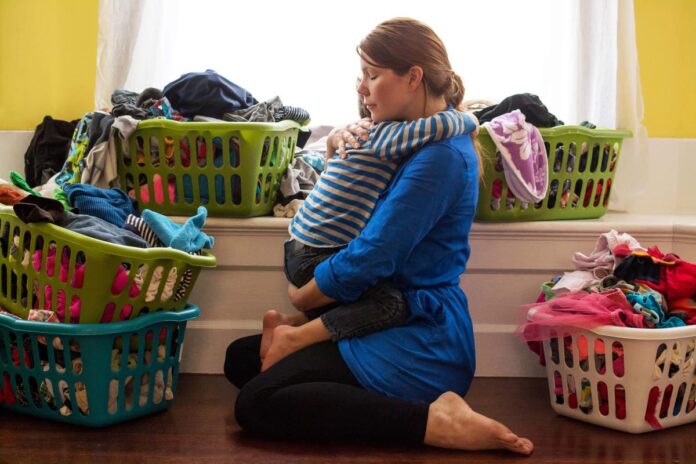Almost two-thirds of women’s working hours each week are unpaid and ‘ignored’ by official statistics measuring economic activity, leaving them short-changed and pushed deeper into poverty, according to Oxfam . The charity said not taking account of unpaid care for a child or sick adults, or domestic work such as cooking and cleaning – much of which is carried out by women – means these activities are invisible in the formal economy and not valued properly. It has added its voice to calls to move ‘beyond GDP (gross domestic product)’ – the main measure of a country’s economic growth based on the value of goods and services produced during a given period. Oxfam said GDP is ‘anti-feminist and colonial because it sustains a framework of value creation and productivity that only counts what can be monetised’. It added: ‘Market relations are given precedence over family and social relations, individualism over solidarity and interdependence, rational choice over wellbeing. ‘Women are rendered to the ‘private’ sphere and their work is invisible. At the same time, GDP has helped erase indigenous and alternative conceptions of what can and should be valued.’ It said GDP has ‘become the yardstick against which all economic progress is measured’ and that its ‘limited focus reflects the narrow-minded, Eurocentric and outdated framing that shaped its creation’. The charity added: ‘It is high time for a reboot that reflects the reality and the needs of society today.’ The charity said its analysis using International Labour Organisation data suggested that of the total number of hours worked weekly around the world by men and women, 45% are in unpaid care work and those contributions are excluded from GDP calculations. It said 65% of women’s weekly working hours globally are unpaid and do not contribute towards GDP. The Office for National Statistics (ONS) – which collects, analyses and publishes statistics about the UK’s economy, society and population – has already said it is ‘working on radical plans to go ‘beyond GDP”, including ‘new and innovative metrics reflecting the impact of economic change on people and the environment’. A report last year by the Centre for Progressive Policy think tank found women in the UK are providing more than twice as much unpaid childcare per year as men – 23.2 billion hours compared with 9.7 billion hours – as well as spending more time caring for adults than men. Women are being short-changed the world over, pushed deeper into time and income poverty. To add insult to injury, the majority of their work is ignored by official statistics Anam Parvez, Oxfam head of research report author, said ‘Women are being short-changed the world over, pushed deeper into time and income poverty. To add insult to injury, the majority of their work is ignored by official statistics. Unpaid care is a hidden subsidy to the global economy; without it the system would collapse. ‘Governments’ fixation on GDP leads to policies that are directly harming women, for example cuts to vital public services. Those who experience intersecting inequalities, such as racial discrimination, are particularly impacted. Women are expected to act as shock absorbers, cushioning the impact of austerity and other harmful policies through their unpaid labour.’ She said Government policies and budgets ‘should be guided by a set of metrics that look at the whole picture, including closing the divide between the richest and the rest, instead of relentlessly pursuing growth for its own sake’. The UK Government said traditional economic measures, such as GDP, remain some of the most useful indicators of economic performance but also recognised there are limitations and said it should not be seen as an all-encompassing measure of welfare. It said it has provided the ONS with an additional £25 million to help improve UK economic statistics – including through the Beyond GDP initiative. A Government spokesperson said: ‘ One of the Prime Minister’s five priorities is to grow the economy, this is the best way to delivery prosperity, better-paying jobs and increase productivity. ‘We have a progressive tax system in which top 5% of earners are projected to pay half of all income tax this year and we have taken millions of lower earners out of paying tax altogether by consistently raising income tax and national insurance allowances. ‘This has allowed us to provide the equivalent to £3,300 in support per household on average over the last two years.’ An ONS spokesperson said that while GDP is a good measure of changes in the size of the economy, ‘it does not record the impact of growth on the environment or people and nor does it include the many hours of unpaid work’. They added: ‘That’s why we have recently published new estimates of inclusive growth, which does include unpaid work undertaken at home. We plan to develop these figures further in coming months to show the impact of growth on the environment.’
‘Women short-changed as 65% of weekly working hours ignored in official data’
Sourceindependent.co.uk
RELATED ARTICLES


